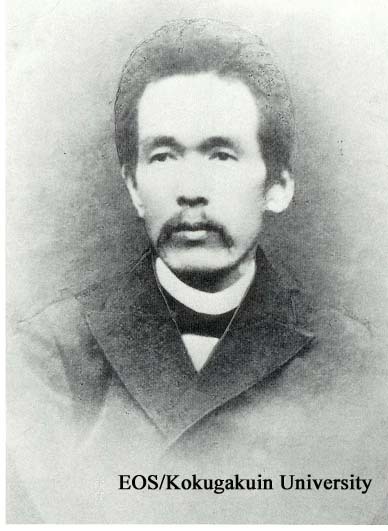- トップ
- Encyclopedia of Shinto
- Inoue Kowashi
Encyclopedia of Shinto
| Main Menu: | |
| Links: |
詳細表示 (Complete Article)
| カテゴリー1: | 8. Schools, Groups, and Personalities |
|---|---|
| カテゴリー2: | Personalities |
| Title | Inoue Kowashi |
| Text | (1843-95) Bureaucrat and politician of the Meiji era, who used the epistolary name Goin. Born on the eighteenth day of the twelfth month of 1843 in the castle town of Kumamoto as the third son of Iida Gongobei, a vassal of the "Nagaoka Inspector" (nagaoka kenmotsu, a high official and hereditary elder close to the domainal lord). In 1866 Kowashi was adopted by Inoue Shigesaburō, another vassal of the Nagaoka. Known as a highly intelligent child, Inoue entered private study with Kinoshita Saitan, an instructor at Kumamoto's Jishūkan domainal academy, eventually becoming one of the academy's resident students. In 1867 Inoue was dispatched as a student to Edo, where he studied French culture. In 1870 he was appointed "Associate Student Representative" (chūshachō) of the new Meiji government's Daigaku Nankō (South College, later representing the social studies and humanities division of University of Tokyo). Beginning the following year he served at the Ministry of Justice. After this he was recognized by senior government officials such as Etō Shinpei (1834-74), Ōkubo Toshimichi (1830-1878), Iwakura Tomomi (1825-83) and Itō Hirobumi (1841-1909), as he advanced his career as a bureaucrat. In 1877 he was appointed Chief Secretary to the Cabinet, in 1881 Chief Secretary to the House of Councilors, in 1884 adjunct Chief Librarian of the Imperial Household Ministry (Kunaishō), in 1888 Director General of the Cabinet Legislation Bureau and Adjunct Chief Secretary of the Privy Council, in 1890 Privy Councilor, in 1893 Minister of Education and in 1895 he was conferred the title of Viscount. In the course of his career Inoue contributed to the drafting of the Meiji Constitution, the Imperial House Code (Kōshitsu tenpan), the Imperial Rescript on Education, as well as many other bills, ordinances and governmental policies. He died March 17, 1895, at the age of fifty-three. Historical materials pertaining to Inoue, including many of his writings, are collected in the six-volume Inoue Kowashiden shiryōhen. -Shibata Shin'ichi |




